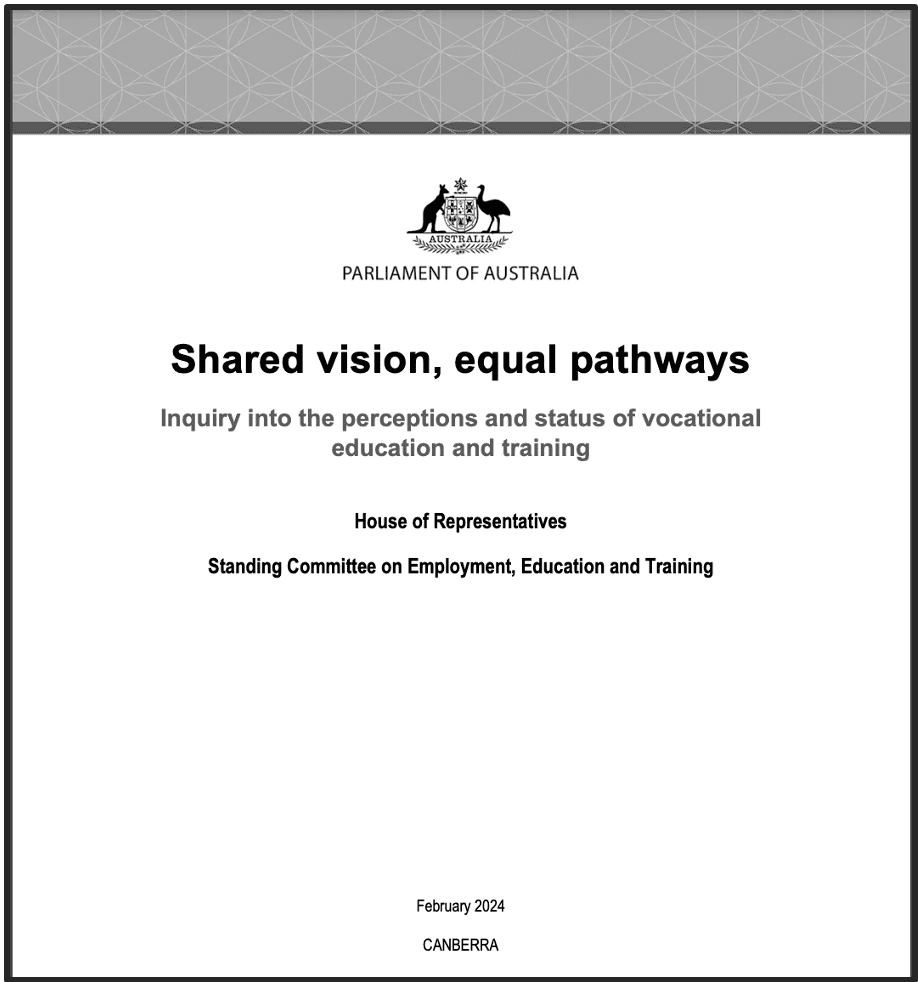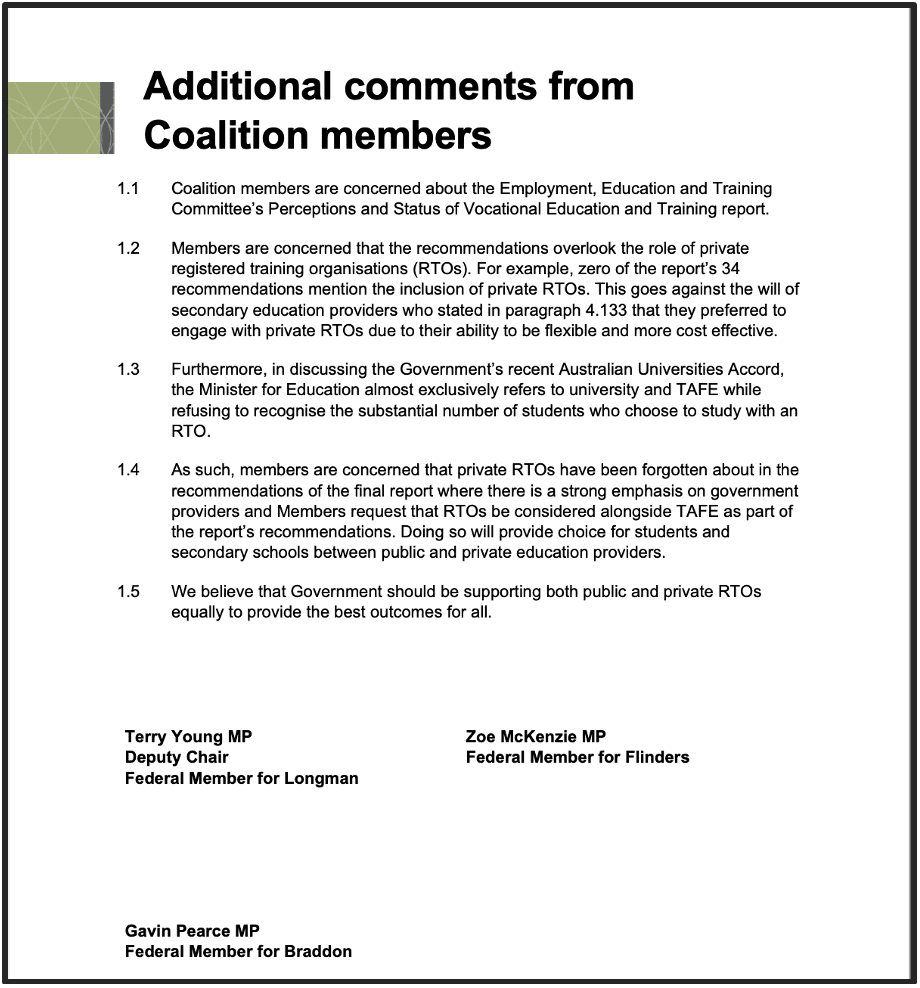
The latest VET inquiry – what changes lie ahead?
With a lot of changes being made to the Australian VET and higher education sectors – it has been surprising to see so little attention being paid publicly to the recent report of the House of Representatives’ Standing Committee on Employment, Education and Training’s Inquiry into the Perceptions and Status of VET.
The Committee was asked to undertake the inquiry by the Minister for Skills and Training, the Hon Brendan O’Connor. The inquiry kicked off in November 2022 – and it has recently landed its Final Report.
The media release issued by the Committee highlighted the following recommendations from the 34 contained in their report:
- Significantly overhaul the functions of the National Careers Institute.
- Developing a national careers education strategy for schools.
- Improving VET delivered to secondary school students via cooperative partnerships and increased school funding.
- Rationalising the development and implementation of VET qualifications.
- Addressing systemic barriers to women’s participation in VET, with a focus on eliminating gender-based violence and workplace discrimination and challenging gender stereotypes.
- Enhancing apprenticeships, including by piloting a network of industry-led apprenticeship support providers, lifting pay and conditions, and exploring new apprenticeship pathways.
- Creating a robust framework for developing, implementing, and funding micro-credentials.
- Implementing measures to attract and retain a VET workforce with industry expertise and a greater range of pedagogical competencies; and
- Defining a clear roadmap to a genuinely integrated tertiary education system.
I was more interested in some of the other more substantial recommendations the Committee made, including:
- Enabling the National Careers Institute to publish provider-level data
- Reviewing the ATAR to determine if the way it is calculated makes university more desirable to school leavers than VET
- Reviewing entry measures for VET and higher education courses and considering whether there should be a move away from ATARs for educational entry and instead more use of learner profiles
- Funding all schools to 100% of the School Resourcing Standard (from a section of recommendations related to VET in Schools)
- Setting TAFE Institutes on the pathway to self-accreditation
- Exploring the introduction of proficiency-based assessments in VET (with expert input)
- Exploring mechanisms to increase the take-home pay of apprentices and trainees
- Developing a national framework for microcredentials that does not allow microcredentials “on their own, (to) ‘stack’ into a full qualification”, and
- Aligning fees and subsidy amounts (to the extent possible) for government-funded VET qualifications
Interestingly the Coalition members of the Committee chose not to issue a dissenting report. Instead they provided the following additional comments:

What does it all mean?
The Minister will be pleased that a number of the Committee’s recommendations echo reforms he already has in train. I suspect he is also likely to act to want to work with his state and territory counterparts on a number of the other recommendations eg better promoting VET and helping students make the right career choices.
If state and territory governments (who have primary responsibility for both schooling and VET) want to make improvements to VET in Schools, then the Committee’s recommendations on this aspect of VET could also be taken forward (probably with some additional funding from the Commonwealth to help sweeten the deal).
But… the real significance of the report is in the Committee’s support for:
- greater national consistency in VET fees and subsidies for government-funded courses
- provider-level data to inform student choice, and
- self-accreditation for TAFE Institutes.
The first of these recommendations (greater national consistency in VET funding) is due to be progressed when first the national plan and then the state and territory plans, which complement the National Skills Agreement, are finalised. They are due in the next couple of months.
If TAFE Institutes can bring forward a proposal to self-accredit some of their courses which has the support of key employer bodies and relevant unions (for example in the ICT or business sectors – where GenAI and other technological innovations are raising serious questions about the utility of these respective Training Packages) then I think it is likely they could get a self-accreditation pilot off the ground… And then it remains to be seen what further reforms might flow from that pilot and what such a change would mean for private and community providers…?
As for the publication of provider-level data, I was involved in work to support the November 2006 Skills Ministers’ decision (then meeting as the Ministerial Council for Technical and Vocational Education) that RTO audit reports should be published.
Incredibly, almost a quarter of a century later we still do not have even that basic level of insight into what the regulator thinks of a provider’s operations.*
Furthermore the NCVER has been collecting, and collectively reporting, data on total VET activity for almost a decade and yet we seem no closer to allowing prospective students to know anything about the number of students different providers have enrolled with them, their current levels of student satisfaction and graduate employment outcomes, or any of the other basic details necessary for to make an informed decision about where to study.
These latter recommendations should be progressed as a priority… but I am not holding my breath.
———————————————
*Unless the RTO receives state government funding – with a number of state governments requiring RTOs to publish this information in return for their government funding.




